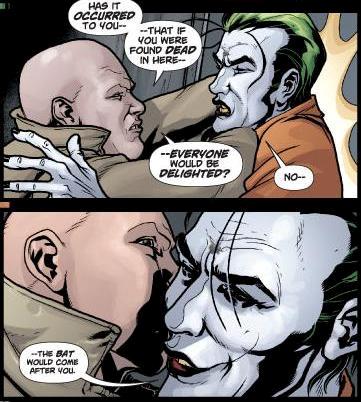
A interesting Joker. Who would have thought it?
February 8th, 2011 Posted by Esther Inglis-ArkellMy eyelash fluttering crush on Paul Cornell and all his works continues in this month’s Action Comics. In issue #897 he has done the near-impossible. He has made the Joker interesting. I would never have guessed that such a thing was possible. The last person to do it was Grant Morrison, and that only lasted for a paragraph or two.
Almost every other Joker story for the last twenty years has mixed up ‘interesting’ with ‘awful’. The Joker did things like steal everyone’s babies and throw them around for fun. He showed up in a story and gagged Robin before taking him on a joyride and running down Christmas shoppers. He was the guy who shot the hero’s daughter, father, sister, school friend, or best friend. He wasn’t made interesting; he was just given enough gore and horror to have a vague, sick, car-accident-type fascination for the readers.
This most effusive of characters, the guy who seriously can’t keep his mouth shut, never really had anything to say. He shot someone, said something cold-blooded and with the word ‘joke’ scattered in somewhere, and then he’d laugh. He’d be obviously killed off – killed off to the point where Superman could find no trace of him after an explosion, and always come back. He made no sense, and without some sense to balance on, no joke can work.
Cornell takes the usual tricks and make them work. (Or most of them. Joker makes reference to boiling a baby, which is think is both distasteful and silly. No one who picks up this comic thinks that The Joker is an okay guy. He doesn’t have to prove how bad he is, and the line, “I’m frequently NOT in this box,” is a credible enough threat without any follow-up threat.)
There’s the mystic thing that is impossible for The Joker to know/do, that he somehow does anyway. Unlike most comics, the thing is explained, instead of just being slide because The Joker doesn’t have to make sense. There’s the balance between sanity and craziness. The Joker alternates between jokes meant as goading and actual explanations phrased in clever ways. There’s the connection with Batman, hinting that one feeds off the other, without being too literal. (At one point, Lex points out that if he killed The Joker, everyone would be happy and he’d get off free. The Joker replies, “No. The Bat would come after you.”) And finally, there is unpredictable behavior. A lot of comics about The Joker stress that, “Anything could happen,” but generally are very predictable. The Joker kills, The Joker makes the most heart-wrenching scenes, The Joker causes pain in particularly gruesome ways, The Joker Makes Things Personal. This happens every Joker comic and it’s never a surprise.
If the hallmark of The Joker is the random behavior, if that marks him as truly different from Batman, then that character hasn’t really shown up in years. He shows up here, and it’s actually interesting. Pair it with a strong, logical character as Lex Luthor and you get the fascinating spectacle of seeing two characters look at each other, understand each other, and say, “You’re out of your mind.” What’s more, we agree with both of them. It’s nice.


